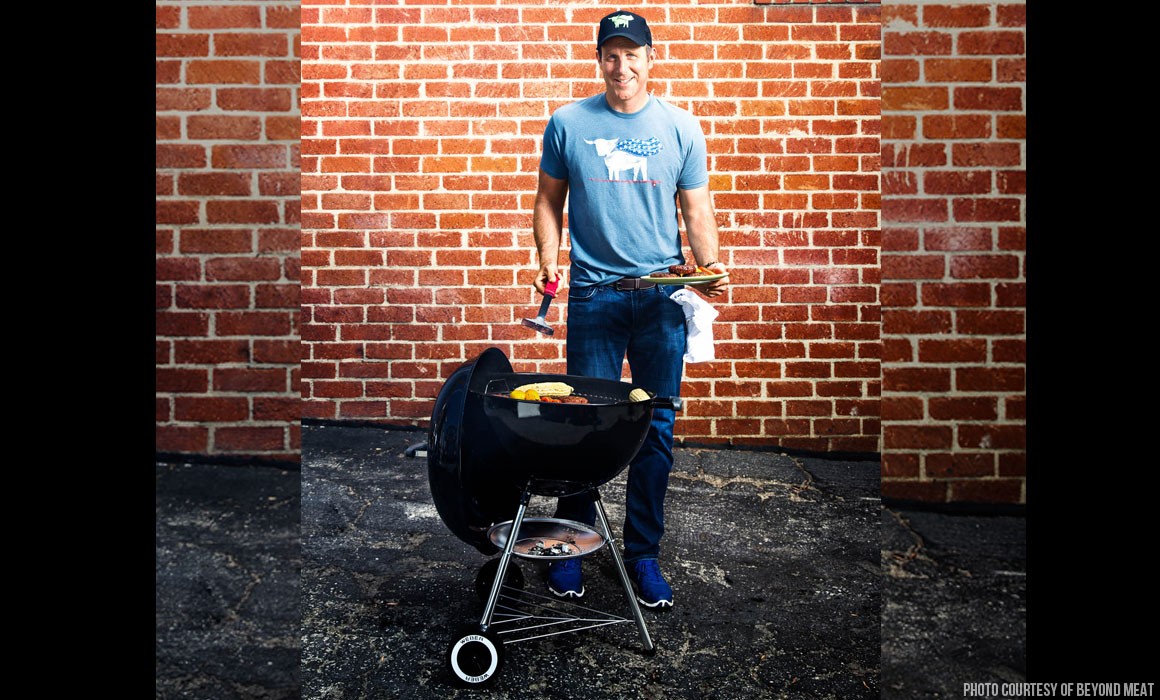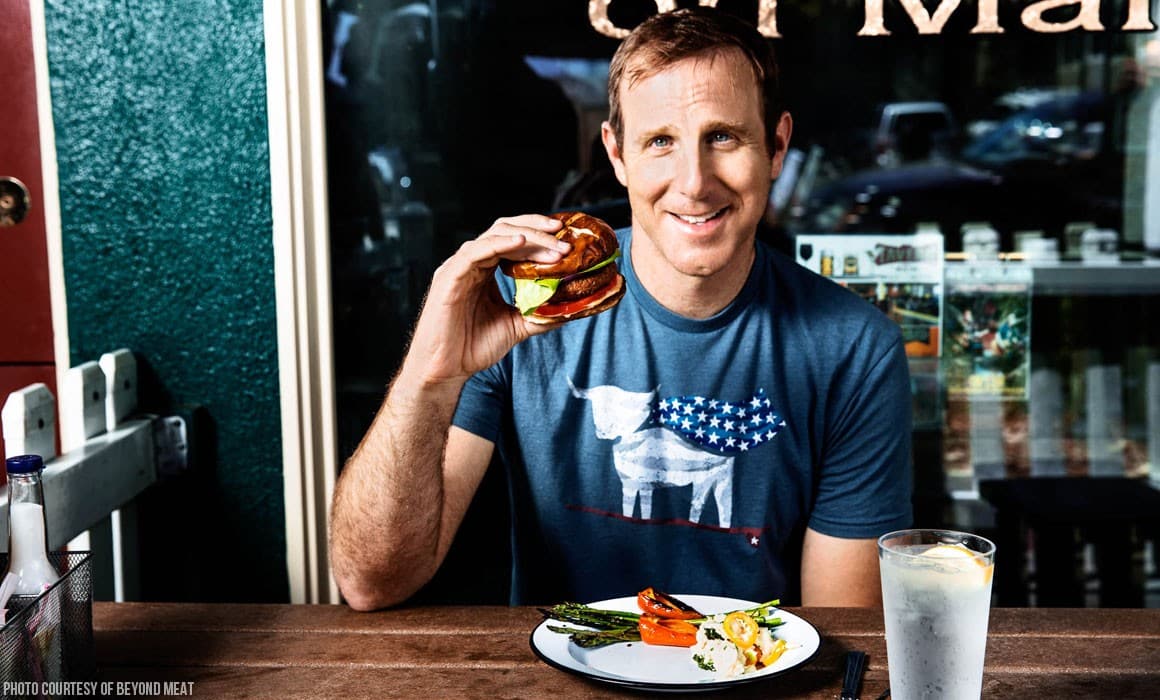Carnivores beware. There’s a new burger in town and it’s not made of meat. Beyond Burger by Beyond Meat is changing the game for plant-based protein and creating an alternative that even the most sensitive meat-eating pallets would label delicious!
While the trend toward vegan and vegetarianism has popularized over the last few years, this idea of “faux meat” has not quite caught on with the general public…that is, until now. Ethan Brown, founder of Beyond Meat, and the driving force behind their latest product “Beyond Burger”, is convinced the closer plant-based protein can get to emulating animal meat through an 80/20 ratio, the greater the demand for these substitutes will be.
As someone who is breaking down agricultural barriers and paving the path to a more sustainable and ethical cuisine landscape, MiLLENNiAL is honored to name Ethan Brown our 2016 Winter Mentor. We caught up with the genius behind the disruptive food brand to learn how exactly he got a plant-based burger to make it into the refrigerated meat section of US grocery stores.
Beyond Meat Unlocks the Power of Plant Protein
A vegan for the last 15 years, Ethan credits his father for his love of animals and the environment. Growing up in the Metro D.C. area, his father, a professor at the University of Maryland, started a diary farm during his youth and would often take him for visits as a kid. “Those times with him, I just began to appreciate animals more and agriculture and what went into it…that was an important part of my childhood experience,” he tells us.
Ethan later went into the fuel cell sector, “working on protonic exchange fuel membrane cells, which are hydrogen powered fuel cells,” he explains. Although he had built a great career in the alternative energy field, he felt he could be doing something more for society, something that wouldn’t take generations to build.
“I kept coming back to the question of ‘Why do you need an animal to create a piece of meat?’,” he says. And furthermore, why do we have an instinctual need to eat meat? Ethan continues, “We can look at meat in two ways: in terms of its origin (chicken, cow, pig, etc.) or we can think of it in terms of composition…what it is actually made of. And it is made up of things that you can find outside of animals.” Protein, iron, zinc, vitamin B and Omega 3s are all found in animal meat and are vital to our bodies. But as Ethan points out, all of these nutrients can be found in other natural sources.
“We can look at meat in two ways: in. terms of its origin or in terms of composition.”
“You didn’t see the level of research that was really required to solve the problem of producing meat. I wanted to take an alternative energy mindset to the problem.” The new Beyond Burger is made primarily out of pea protein. “I started at the core which was ‘how do you create muscle-like fiber protein?’.” Through an aqueous process, Beyond Meat scientists separate the proteins from the plant and run them through a heating, cooling, and pressurized system. This realigns and re-stitches the protein structure to not only resemble meat but also create a similar composite.
“There is nothing particularly special about pea protein, we are just looking for amino acids that can run through our system,” he says. As more companies look to develop alternative proteins, the variety of vegetable sources will simultaneously increase. Ethan adds that he is looking forward to the day when he can use lentil, camelina, lupin, or mustard seed protein for the base of his meat products.
“Someday you’ll be able to go to the meat section and get a burger made from lentils or pea or yeast – you’ll have all these different proteins that you can have on a daily basis. I think it’s fascinating for the consumer.”
Changing Consumer Eating Habits
Over the last decade, US beef consumption has dropped 12 percent. And yet, while the demand for beef is seeing a steady decline, alternative protein sources are not on the rise. Ethan refers to this as the meat gap. “People are hungry for the solution but the products haven’t been good enough. So there’s this meat gap. Meat is declining, but nothing is taking its place.”
Beyond Burger is currently the alternative meat market’s most competitive product. It smells, looks, and even tastes similar to hamburger meat, but Ethan doesn’t quite think it hits the 80/20 goal. “Beyond Burger is a culmination of the good work we’ve done over the years, but we need to make it better.” He says he wants to improve the flavor, appearance, and texture of the burger.
“With each improvement in the product, you unlock another step of demand.” If habits can change conveniently for consumers because no extra step or sacrifice is required to make the better choice, then products like Beyond Burger will set a new precedence for how the industry evolves.
“I want to be in the game, changing the game.”
And the corporations are already taking notice. This year [2016] Tyson Foods bought a five percent stake in Beyond Meat, helping to take its products to mass market. Understanding the controversy the giant food producer brings to the mission of Beyond Meat, Ethan responds, “I want to be in the game, changing the game where the issues are most relevant… Being in the meat case, partnering with Tyson, those things lead to real change.”
It’s exciting to see Tyson’s interest in perpetuating a plant-based meat movement, but as Ethan suggests, Beyond Meat doesn’t have to do much to Tyson. “If we create the products that consumers want, the consumers will create the change that they want to see,” he says.
Feeling the Weight of the World
Beyond Meat’s success in the US has garnered a lot of attention from other global regions. Asia and Europe are among two markets that Ethan and his team are figuring out how to expand to, but for now, his focus lies within the United States.
The stereotypes that hover around the industry still exist. Prior to the Beyond Burger, plant-based protein has not been seen as a viable mass-market alternative. And the biggest obstacle that stands in the way for companies like Beyond Meat is perception.
Asking the public to remove the association of meat with animals is the hardest part. “People have been referring to this category as faux or fake. The first obligation we have as an industry is to create a piece of meat from plants that sheds that nomenclature.”
Like any passionate entrepreneur, Ethan admits his impatience can sometimes get the best of him. “When you are pushing on all cylinders at all times, you’ll make mistakes. Try to balance the sense of urgency with some sense of structure. Patience is important.”
Innovative products like Beyond Burger take time to develop. It’s not just about the quality, but hitting the market when consumers are ready for it. And it may just be that 2017 is the year when we see the meat gap close. “We have a philosophy within the company of really innovating in the public eye and giving the consumer the best we can do every year.”
Beyond Meat products are available in over 11,000 grocery stores across the U.S. Rolling out the Beyond Burger slowly, the product is currently on sale in select Whole Foods on the East Coast as well as prepared as a new menu item at the 28 West Coast locations of the vegan fast-casual chain Veggie Grill.
To learn more about Beyond Meat, the Beyond Burger, or Ethan Brown visit BeyondMeat.com and follow them on Facebook, Instagram and Twitter.
Related Reading:
How Ike Fontaine Takes the Lead on Client Acquisition Through Podcasting
How David Adelman is Shaking Up the Industry With American Harvest Vodka


